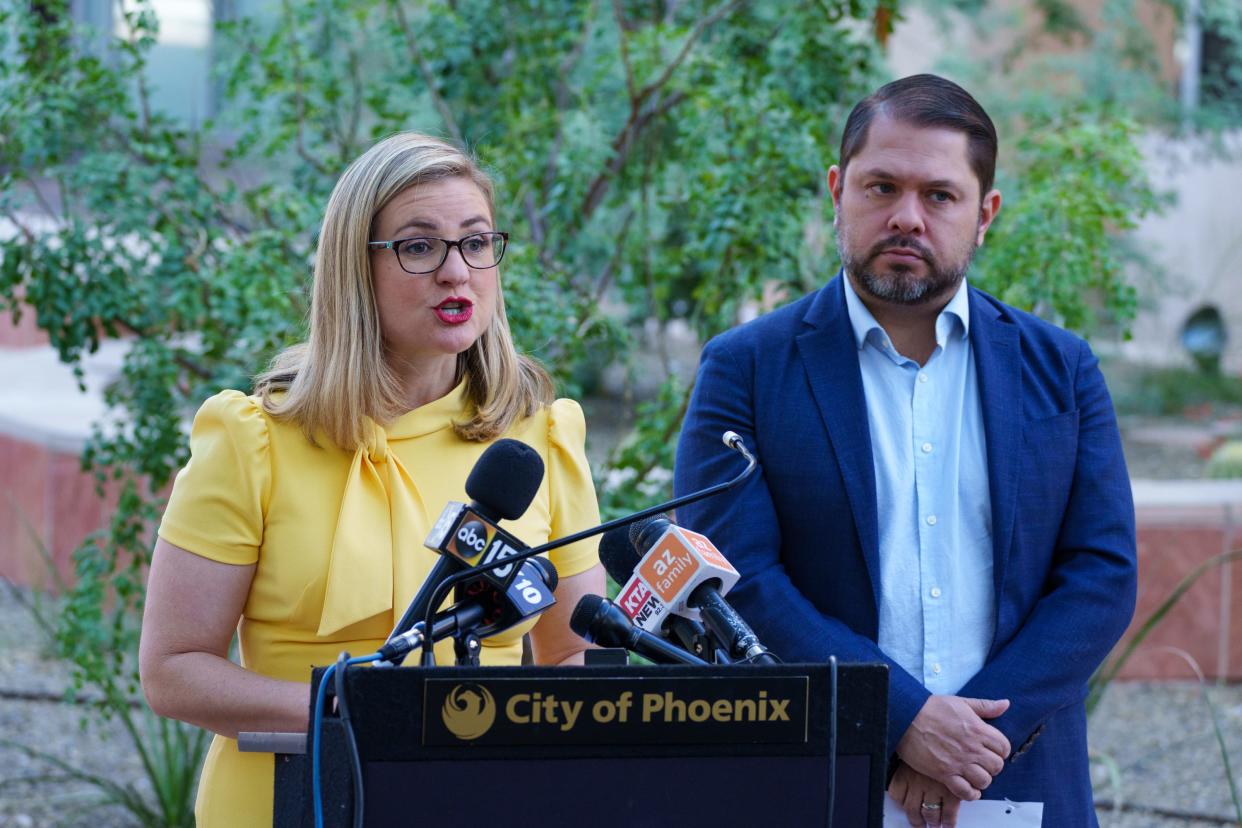Phoenix leaders' goal to add extreme heat to FEMA's emergency list advances

U.S. Rep. Ruben Gallego is pushing to make extreme heat eligible for the same relief available after other major disasters, such as hurricanes, from the Federal Emergency Management Agency, or FEMA.
The change would provide federal resources for cities during heatwaves when temperatures exceed normal averages for the time of year and therefore endanger the safety and wellbeing of an area's residents, Gallego said. The relief could mean additional cooling centers, pop-up shelters and resources for individuals most vulnerable to heat, such as those who are homebound or unhoused.
FEMA spokesperson David Passey said the assistance would become available once the need exceeded what local and state resources could handle.
Gallego, D-Ariz., introduced legislation on June 5 to amend the list of eligible disasters to declare extreme heat a major disaster. If enacted, the Extreme Heat Emergency Act could take effect by January 2024.
The legislation, which Gallego called a bipartisan effort, will likely be referred to the Republican-led House Homeland Security Committee, according to staff from Gallego's office. The bill would need to make it through a subcommittee and then the full committee before going to the House floor. There, it could be voted on as a standalone bill or become part of a broader package.
FEMA provides relief for two categories of disasters: emergency and major. Emergency disasters provide immediate on-the-ground assistance with funding up to $5 million, whereas major disasters qualify for a wider range of both immediate and preventative relief, potentially including permanent infrastructure.
The bill comes two months after Phoenix Mayor Kate Gallego called on FEMA to add extreme heat to the list in her 2023 State of the City. Last month a study found that half of Phoenix's population would require emergency care and 1% of the city's 2010 population, or about 13,250 people, would die if a five-day power blackout coincided with a heat wave.
Report: Phoenix is not prepared for a simultaneous heat wave and blackout, new research shows
The congressman and mayor, who divorced in 2016, announced the status of their joint effort June 9 in front of Phoenix City Hall.
Mayor Gallego said her call to action stemmed from conversations with mayors in the Pacific Northwest "who wanted to know what was possible and what they could do to save lives during heat events."
Northwest cities, such as Portland, have seen fatal heatwaves in recent years, most notably in June 2021 when a severe five-day heatwave shattered weather records, resulting in hundreds of deaths, crumbling roadways and harming wildlife. Portland experienced another record-breaking heatwave last month.
Mayor Gallego pointed to the discrepancy between relief provided for "six different categories just for storms alone," but not for heat, which "causes more deaths each year than most other natural hazards combined," she said.
"A hurricane gets a lot of attention and a lot of resources. But if you look at loss of life, heat really deserves the focus, if we want to save lives, if we value people more than the houses on the beach," Mayor Gallego said.
Rep. Gallego said extreme heat emergencies that trigger a FEMA response would take into account typical weather for the area.
"As Phoenicians, whenever we travel somewhere and people are complaining about 90-degree weather, we leave, but those areas aren't acclimated to that. They don't have the building codes. They don't have, for example, the air conditioning mandates that we have," Gallego said.
Rep. Gallego also highlighted another piece of legislation he's pushing to provide federal grants to combat the urban heat island effect in hot cities like Phoenix. The Excess Urban Heat Mitigation Act of 2023 would provide $30 million per year between 2023 and 2030. Local governments could apply for funding to plant trees for shade, install cool pavement, add cooling centers or provide heat mitigation education.
Mayor Gallego has made combating climate change a cornerstone of her political career, campaigning on a more sustainable and environmentally friendly city when she first ran for the City Council in 2013.
As Councilwoman, Gallego represented a district in south Phoenix, where studies have shown residents are disproportionately affected by urban heat and poor air quality. She spearheaded the nation's first publicly funded municipal heat office as mayor, Phoenix's Office of Heat Response and Mitigation.
Since 2020, Phoenix has been installing cool pavement, a reflective coating applied to roadways to reflect the sun and keep the city cooler. This week, the city laid its 100th mile of cool pavement. The city is also expanding "cool corridors" this year, where trees and other shade structures are installed in areas with high pedestrian use.
Last month, the Phoenix City Council dispersed $5.5 million in grants from federal American Rescue Plan Act funds for shade canopy programs. The council also approved an Active Transportation Plan, which outlines the city's pedestrian and cyclist infrastructure goals, that calls for more city action on heat relief.
The mayor's and congressman's effort to add extreme heat to FEMA's list was unanimously supported, Mayor Gallego said, at the U.S. Conference of Mayors in early June. More than 1,300 mayors representing cities of 30,000 people are members of the national group.
Reporter Taylor Seely covers Phoenix City Hall for The Arizona Republic. Reach her at tseely@arizonarepublic.com or by phone at 480-476-6116.
This article originally appeared on Arizona Republic: Arizona's U.S. Rep. Ruben Gallego pushing extreme heat for FEMA list

